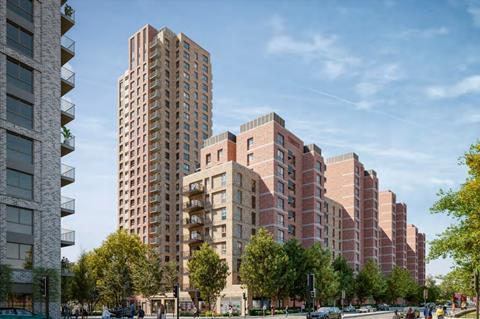Housebuilder to focus instead on ÔÇťfinancial strengthÔÇŁ in ÔÇťvolatile and unsupportiveÔÇŁ operating environment
Berkeley has put its investment in new housing developments on hold due to what it describes as an ÔÇťunsupportiveÔÇŁ operating environment.
The housebuilder, in interim results for the six months to 31 October, said the current planning and regulatory environment is ÔÇťcomplex, uncertain and unpredictableÔÇŁ.
Rob Perrins, chief executive of Berkeley, said: ÔÇťWe are wholly aligned with the ambition to build more quality affordable and private homes where they are most needed, and to play our full part in meeting the countryÔÇÖs net zero target.
ÔÇťHowever, the burden of achieving this, at a time when the economy is adjusting to more normal conditions following a decade of zero interest rates, must be recognised and priorities set, as housing cannot continue to cross-subsidise at these levels, without increased public funding.ÔÇŁ

In the update, Berkeley listed a number of changes which it said have led to uncertainly, including updates to the National Planning Policy Framework and local plans, the Levelling Up and Regeneration Act, second staircase rules, changes to building regulations on energy efficiency, ventilation and overheating, the Future Homes Standard, the introduction of a residential property developer tax, new ║┌Â┤╔šă° Safety Act requirements and the developer pledge to remediate buildings.
Berkeley said that if it has not restarted investment in new developments by 30 April 2027, it will return all of the profit after tax in the period to shareholders.
Berkeley built 1,785 homes in the first half of the year, down from 2,080 the year before while its number delivered through joint ventures fell from 251 to 204 over the same period.
>>See also:
>>See also:
It however, increased its pre-tax profit 4.6% from £284.8m to £298m. Its turnover stayed broadly flat at around £1.2bn.
It said it is on track to meet its original guidance of £1.05bn of pre-tax profit over the next two financial years, and extended this guidance to £1.5bn over the next three years.
Berkeley also said build cost inflation is now at ÔÇťnegligibleÔÇŁ levels apart from some isolated trades where demand is high. It said contractor insolvency is now a greater supply chain risk ÔÇťas the inflation cycle reverses and demand for construction services reducesÔÇŁ.
It said that it has yet to start work on 34 buildings to carry out fire safety work and would do so soon, it said, adding: ÔÇťIt is BerkeleyÔÇÖs preference to take full responsibility for all its relevant buildings and to complete any required works itself as this will speed up the overall process of remediation. We are seeking recoveries from the supply chain and insurers where appropriate.ÔÇŁ


























No comments yet